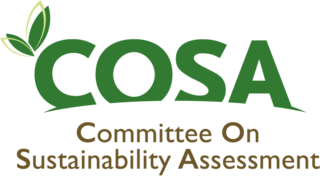
Subsistence agriculture occurs when farmers grow crops to meet the needs of themselves and their families on smallholdings. Subsistence agriculturalists target farm output for survival and for mostly local requirements. Planting decisions occur principally with an eye toward what the family will need during the coming year, and only secondarily toward market prices. Tony Waters, a professor of sociology, defines "subsistence peasants" as "people who grow what they eat, build their own houses, and live without regularly making purchases in the marketplace".

Wangarĩ Muta Maathai was a Kenyan social, environmental, and political activist who founded the Green Belt Movement, an environmental non-governmental organization focused on the planting of trees, environmental conservation, and women's rights. In 2004 she became the first African woman to win the Nobel Peace Prize.

The International Food Policy Research Institute (IFPRI) is an international agricultural research center founded in 1975 to improve the understanding of national agricultural and food policies to promote the adoption of innovations in agricultural technology. Additionally, IFPRI was meant to shed more light on the role of agricultural and rural development in the broader development pathway of a country. The mission of IFPRI is to provide research-based policy solutions that sustainably reduce poverty and end hunger and malnutrition.

A smallholding or smallholder is a small farm operating under a small-scale agriculture model. Definitions vary widely for what constitutes a smallholder or small-scale farm, including factors such as size, food production technique or technology, involvement of family in labor and economic impact. Smallholdings are usually farms supporting a single family with a mixture of cash crops and subsistence farming. As a country becomes more affluent, smallholdings may not be self-sufficient, but may be valued for the rural lifestyle. As the sustainable food and local food movements grow in affluent countries, some of these smallholdings are gaining increased economic viability. There are an estimated 500 million smallholder farms in developing countries of the world alone, supporting almost two billion people.

The Technical Centre for Agricultural and Rural Cooperation ACP-EU (CTA) was established in 1983 under the Lomé Convention between the African, Caribbean and Pacific Group of States and EU member states. Since 2000 CTA has operated within the framework of the ACP-EU Cotonou Agreement with a mission to “strengthen policy and institutional capacity development and information and communication management capacities of ACP agricultural and rural development organisations. It assists such organisations in formulating and implementing policies and programmes to reduce poverty, promote sustainable food security, preserve the natural resource base and thus contribute to building self-reliance in ACP rural and agricultural development.”. The centre is closed in 2020, after the end of the Cotonou Agreement and the subsequent end of its financing.

Agriculture is a major sector of the Nigerian economy, accounting for up to 35% of total employment in 2020. According to the FAO, agriculture remains the foundation of the Nigerian economy, providing livelihood for most Nigerians and generating millions of jobs. Along with crude oil, Nigeria relies on the agricultural products it exports to generate most of its national revenue. The agricultural sector in Nigeria comprises four sub-sectors: crop production, livestock, forestry, and fishing.
The Global Forum on Agricultural Research and Innovation (GFAR) is an inclusive global forum, enabling all those concerned with the future of agriculture and its role in development around the world, to address key global needs. GFAR provides an open forum for stakeholders across the agricultural spectrum—ranging from researchers, organizations, and farmers—to participate in collaborative discussion and action around the current and future state of agriculture.

The Global Alliance for Improved Nutrition (GAIN) is a non-profit foundation based in Geneva, Switzerland. GAIN was developed during the UN 2002 Special Session of the General Assembly on Children. GAIN’s activities include improving the consumption of nutritious and safe foods for all. The foundation is supported by over 30 donors and works closely with international organisations and United Nations agencies. It has a 20-year history of food system programmes with a focus on adolescent and child nutrition, food system research, fortification, small and medium enterprise assistance, biofortification of crops, and reducing post-harvest losses.
One Acre Fund is a social enterprise that supplies smallholder farmers in East Africa with asset-based financing and agriculture training services to reduce hunger and poverty. Headquartered in Kakamega, Kenya, the organization works with farmers in rural villages throughout Kenya, Rwanda, Burundi, Tanzania, Uganda, Malawi, Nigeria, Zambia, and Ethiopia.
AGRA,formerly known as the Alliance for Green Revolution in Africa is an African-led African-based organization that seeks to catalyse Agriculture Transformation in Africa. AGRA is focused on putting smallholder farmers at the centre of the continent's growing economy by transforming agriculture from a solitary struggle to survive into farming as a business that thrives. As the sector that employs the majority of Africa's people, nearly all of them small-scale farmers, AGRA recognizes that developing smallholder agriculture into a productive, efficient, and sustainable system is essential to ensuring food security, lifting millions out of poverty, and driving equitable growth across the continent.

The Committee on Sustainability Assessment (COSA) is a global consortium of development institutions that work collaboratively to advance sustainability learning with systematic and science-based measurement. COSA applies a pragmatic and collective approach for using scientific methods to develop indicators, tools, and technologies to measure the distinct social, environmental, and economic impacts and are applied in performance monitoring, evaluation, return on investment (ROI) calculation, and impact assessment. COSA has a public mission to open its scientific methods and metrics up to widespread use.
Brian Derek Perry, OBE is a British veterinary surgeon and epidemiologist renowned for the integration of veterinary epidemiology and agricultural economics, as a tool for disease control policy and strategy development, and specialised in international agricultural development. He is an Honorary Professor at the University of Edinburgh, a Visiting Professor at the Nuffield Department of Clinical Medicine, University of Oxford.

The pigeon pea is a perennial legume from the family Fabaceae native to the Eastern Hemisphere. The pigeon pea is widely cultivated in tropical and semitropical regions around the world, being commonly consumed in South Asia, Southeast Asia, Africa, Latin America and the Caribbean.
Lindiwe Sibanda Majele (born 1963) is a Zimbabwean professor, scientist, policy advocate and influencer on food systems. She currently serves as director and chair of the ARUA Centre of Excellence in Sustainable Food Systems (ARUA-SFS) at the University of Pretoria in Pretoria, South Africa as well as founder and managing director of Linds Agricultural Services Pvt Ltd. in Harare, Zimbabwe. She is currently a board member of Nestlé where she is also a member of the Sustainability Committee.

Mary Oyiela Abukutsa-Onyango is a humanitarian and agricultural scientist from Kenya who specializes in olericulture, agronomy, plant physiology. Abukutsa-Onyango is a professor of horticulture at Jomo Kenyatta University of Agriculture and Technology whose work focuses on African indigenous food crops. Abukutsa Onyango has studied how African indigenous vegetables can be used to combat malnutrition in Africa while maintaining a secure form of revenue even during more challenging weather and climate.

Agnes Matilda Kalibata is a Rwandan agricultural scientist and policymaker, visionary leader and president of the Alliance for a Green Revolution in Africa (AGRA). She served as Rwanda's minister of agriculture and animal resources from 2008 to 2014 and began her tenure as president of the Alliance for a Green Revolution in Africa (AGRA) in 2014. Dr. Kalibata served as the Special Envoy of the UN Secretary-General.

Wanjiru Kamau-Rutenberg is an Executive in Residence at Schmidt Futures. Before that she was Director of African Women in Agricultural Research and Development (AWARD). Wanjiru is also the Founder and past Executive Director of Akili Dada, a leadership incubator for African girls and young women and a former Assistant Professor of Politics at the University of San Francisco.

Wawira Njiru, is a Kenyan entrepreneur, nutritionist, and philanthropist, who serves as the executive director of Food for Education, an organization that serves a hot, nutritious and affordable school meal to over 33,000 public primary school children in the urban and peri-urban areas of Kiambu, Nairobi and Mombasacounties.
Mavis Owureku-Asare is a Ghanaian food scientist. She researched the use of solar dehydration to preserve tomatoes. She conducted research showing that poor quality foods were sold in some Ghanaian markets. She is the CEO of Impact Food Hub, a leading Consultancy for Agribusinesses in Ghana. She was a principal research scientist at the Biotechnology and Nuclear Agriculture Research Institute of the Ghana Atomic Energy Commission. She is a fellow of the Norman E. Borlaug Leadership Enhancement in Agriculture Program (LEAP) and a recipient of the African Women in Agricultural Research and Development (AWARD).

During the colonial occupation of Kenya, Black Africans working on farms owned by white settlers were called "squatters" by the British. As of 1945, there were over 200,000 such squatters in the Highlands and more than half were Kikuyu. The Mau Mau rebellion began amongst these squatters in the late 1940s and after independence in the early 1960s, peasants started squatting land in rural areas without the permission of the owner.













